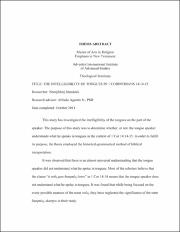| dc.description.abstract | This study has investigated the intelligibility of the tongues on the part of the
speaker. The purpose of this study was to determine whether, or not, the tongue speaker
understands what he speaks in tongues in the context of 1 Cor 14:14-15. In order to fulfill
its purpose, the thesis employed the historical-grammatical method of biblical
interpretation.
It was observed that there is an almost universal understanding that the tongue
speaker did not understand what he spoke in tongues. Most of the scholars believe that
the clause “ὁ νοῦς μου ἄκαρπός ἐστιν” in 1 Cor 14:14 means that the tongue speaker does
not understand what he spoke in tongues. It was found that while being focused on the
every possible nuances of the noun νοῦς, they have neglected the significance of the term
ἄκαρπός, akarpos in their study.
This study has concluded that the tongue speakers understood what they uttered in
tongues based on the following findings. First, the term ἄκαρπός as an expression of
unmet expectation suggested that the edification of the tongues were through the
understanding of what the tongue speaker was saying; thus making it clear that the tongue
speaker understood what he was saying because it is already clear in the context that the
tongue speaker was edified even without interpretation.
Second, the usage of the term ἄκαρπός in the NT suggested that the term νοῦς
stands for the content of the tongues-speech. It made it clear that the tongue speaker was
expressing his own mind in tongues. The gift of tongues might have served as a medium
of communication for the tongue speaker to express his own mind to the Gentiles who
spoke in other languages.
Based upon the findings of this study, the following translation (NAS) of the
passage 1 Cor 14:14-15 is recommended: “For if I pray in a tongue, my spirit prays but
my mind is unfruitful. What ought to be done? I will pray with the spirit, and I will also
pray with the mind. I will sing with the spirit, and I will also sing with the mind.” | en_US |

